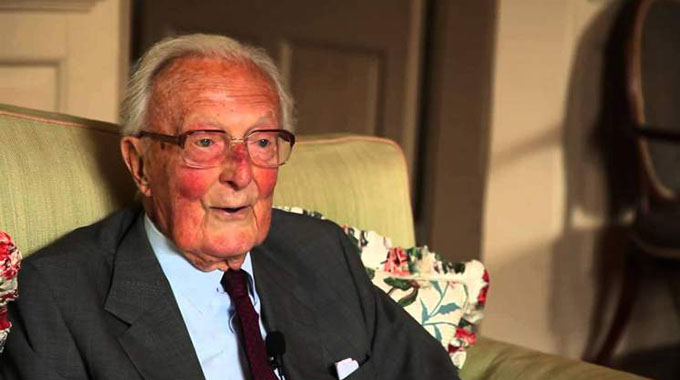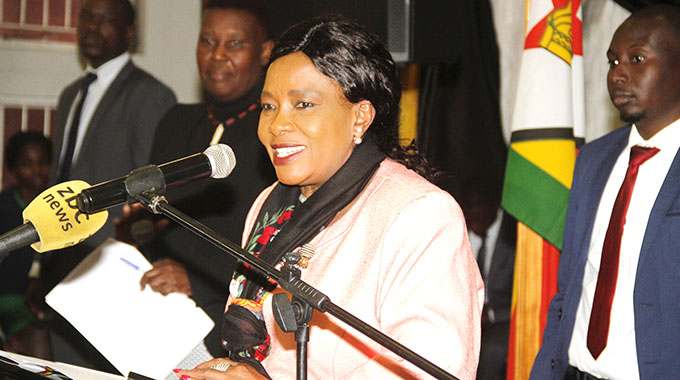Editorial Comment: Lessons for politicians from Lord Carrington

AS Government continues to re-engage the international community to ensure Zimbabwe takes its rightful position in the community of nations, we cannot help, but spare a thought for Lord Carrington, the former British Secretary of State for Foreign and Commonwealth Affairs, who died on Monday aged 99.
Even as we prepare to hold our own watershed elections on July 30 that will usher in the Second Republic, the role played by Lord Carrington towards the end of the liberation struggle in 1979, when he successfully convinced UK Prime Minister Margaret Thatcher to bring the warring parties to dialogue and chart the way forward, shows the power of diplomacy.
Negotiating Zimbabwe’s independence process was a delicate undertaking that many diplomats had failed. This is why our paper aptly described him as a “midwife” to that birth process.
Lord Carrington chaired the Lancaster House talks held in London from September 10 to December 15, 1979 and this culminated in the Lancaster House Agreement that was signed by all protagonists in the struggle for Zimbabwe.
It was unthinkable that the Patriotic Front led by former President Robert Mugabe and the late Vice President Dr Joshua Nkomo could sit in the same room with the likes of Ian Smith, Abel Muzorewa, Ndabaningi Sithole, Chief Chirau and others who had joined the Zimbabwe-Rhodesia camp. But it happened and produced results.
This was not just good diplomacy at play, but visionary leadership on Lord Carrington’s part as he ensured the final agreement would be accepted by all parties. And he succeeded, leading to the first democratic elections in February 1980. On April 18, Zimbabwe attained Independence from Britain.
As one American lawyer wrote in 1979: “Under (Henry) Kissinger, the initiative in Rhodesia was Anglo-American,” says one US diplomat. “Now it’s Anglo. Any progress in Rhodesia should be credited to Carrington.”
Since his departure from the foreign office in 1982, Lord Carrington has been succeeded by 13 foreign ministers, the latest being Jeremy Hunt, who replaced Boris Johnson who resigned the same day that Lord Carrington died.
Equally so, Zimbabwe has seen a number of Foreign Affairs ministers since 1980, the latest being Dr Sibusiso Busi Moyo, who is also spearheading the re-engagement process in President Mnangagwa’s Government.
The British Government, led by another Conservative Prime Minister Theresa May, was among the first to extend an olive branch toward President Mnangagwa, the very day he was inaugurated on November 24, 2017.
Since then, the engagement and re-engagement process has been progressing well despite the two-decade impasse between Zimbabwe, Britain and other Western powers.
This is not a 101 lecture on Zimbabwean politics.
We just want to ask what lessons we can draw from the tightrope that Lord Carrington walked in 1979, as he worked with a diverse group, with diverse ideological leanings, but eventually succeeding to bring about the Lancaster House Agreement.
Parliamentary democracy is now well entrenched on the Zimbabwe political sphere, and the 2018 harmonised election more than any other is an indicator that we are poised to hold a free, fair, credible and violence free election just like what happened in 1980. This despite the diversity and the numbers.
The men and women who participated in the 1979 Lancaster House talks chaired by Lord Carrington had many disagreements, but their egos could not have been bigger than a peaceful Zimbabwe.
As we head towards these elections, there is need to reflect on this critical moment in our history, when a man who was not ashamed to say: “I am a product of privilege,” was prepared to broker a deal for both Zimbabwe and Britain, although Britain stood to gain more.
Why does it look like opposition political parties are retrogressing instead of moving forward to strengthen our democratic tenets? Who stands to benefit more from their current antics, unless they feel that there should be another Lord Carrington to bring different parties to the dialogue table?









Comments